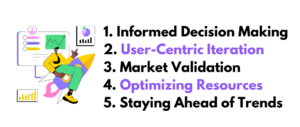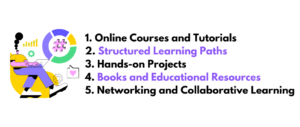In today’s fast-paced and hyper-connected world, data isn’t just a buzzword; it’s the compass that guides your product strategy, propels user satisfaction, and ensures your ship remains on course toward profitability and growth. Whether you’re at the helm of a software application, a consumer gadget, or a cutting-edge service, data proficiency has evolved from a nice-to-have to an absolute must-have skill for product managers.
In this blog post, we’ll embark on a voyage of discovery to uncover the reasons why data mastery is an essential skill in a product manager’s toolkit. We’ll delve into the tangible ways data-driven decision-making can amplify your product’s success, enhance user experiences, and empower you to make strategic choices with unwavering confidence.
So, tighten your grip on that digital compass and prepare to set sail into a world where data isn’t just a collection of numbers; it’s the wind in your product’s sails, propelling it towards unprecedented horizons.
Let’s dive in.
5 Reasons Why Product Managers Have to Understand Data
In the realm of modern product management, the significance of data cannot be overstated. Data-driven decision-making has become a cornerstone for successful product development and optimization.

1. Informed Decision Making
Data provides product managers with valuable insights into user behavior, preferences, and usage patterns. This information empowers them to make informed decisions about feature prioritization, enhancements, and overall product direction, reducing the reliance on gut feelings or assumptions.
2. User-Centric Iteration
Through data analysis, product managers can identify pain points and areas of improvement within their product. By understanding user interactions and feedback, they can iterate on the product to align more closely with user needs, resulting in a user-centric design that fosters satisfaction and loyalty.
3. Market Validation
Data allows product managers to validate their ideas and hypotheses within the market. By tracking key performance metrics and user engagement, they can ascertain whether their product is effectively addressing a real market need or if adjustments are required to achieve product-market fit.
4. Optimizing Resources
Efficient allocation of resources is paramount in product management. Data helps product managers optimize resource allocation by identifying high-impact features, eliminating underutilized ones, and streamlining development efforts, ultimately leading to cost savings and improved resource utilization.
5. Staying Ahead of Trends
The tech landscape is dynamic and ever-evolving. Data equips product managers with the ability to stay ahead of industry trends by analyzing competitor performance, market trends, and emerging technologies. This insight enables them to proactively adapt their product strategies, ensuring relevance and competitiveness in the market.
Skills Required to Work with Data
Working with data requires a diverse skill set that spans technical, analytical, and communication abilities. Whether you’re a data analyst, scientist, or a professional in any field that involves data-driven decision-making, here are the essential skills you need to excel in handling and interpreting data:
1. Data Literacy
An understanding of fundamental data concepts is crucial. This includes knowing the difference between various data types (quantitative, qualitative), understanding data structures (databases, spreadsheets), and being familiar with basic statistical concepts (mean, median, standard deviation).
2. Data Analysis Tools
Proficiency in data analysis tools and software is key. This might involve mastering programming languages like Python or R, and utilizing libraries like Python, NumPy, and Scikit-Learn. Additionally, knowledge of tools like SQL for database querying and data manipulation is highly beneficial.
3. Statistical Thinking
A strong grasp of statistics enables you to draw meaningful insights from data. This includes understanding probability, hypothesis testing, regression analysis, and other statistical techniques. Statistical thinking helps you make informed decisions and interpretations based on data patterns.
4. Data Visualization
The ability to present data visually is essential for conveying complex insights in an accessible manner. Mastery of data visualization tools such as Tableau, Power BI, or libraries like Matplotlib and Seaborn in Python allows you to create compelling charts, graphs, and dashboards.
5. Domain Knowledge
Contextual understanding of the industry or field you’re working in enhances your data interpretation. This knowledge helps you ask the right questions, identify relevant variables, and make meaningful conclusions from data analysis.
6. Critical Thinking
Analyzing data goes beyond applying formulas and techniques. Critical thinking enables you to question assumptions, identify biases, and consider alternative explanations for patterns in the data. It helps you avoid drawing incorrect or misleading conclusions.
7. Problem-Solving
Data professionals often tackle complex problems. Strong problem-solving skills are crucial for formulating hypotheses, designing experiments, and devising data-driven solutions to real-world challenges.
8. Data Cleaning and Preprocessing
Raw data is often messy and requires cleaning and preprocessing before analysis. Skills in data cleaning, handling missing values, outlier detection, and transforming data into usable formats are vital for accurate results.
9. Machine Learning Basics
Familiarity with machine learning concepts allows you to leverage predictive and analytical models for data-driven insights. Understanding algorithms, model evaluation, and feature engineering are beneficial skills.
10. Communication Skills
Translating technical findings into actionable insights is a key aspect of working with data. Strong communication skills enable you to explain complex analyses to non-technical stakeholders, facilitating informed decision-making across an organization.
11. Ethics and Privacy Awareness
As data stewards, it’s important to understand ethical considerations and privacy regulations when handling sensitive or personal data. Ensuring compliance and maintaining data integrity are vital responsibilities.
12. Continuous Learning
The field of data analysis is rapidly evolving. Being open to learning about new tools, techniques, and trends is essential to stay relevant and proficient in your role.
How to Acquire Data Skills?
Acquiring data skills is an empowering journey that opens doors to a world of insights and opportunities. Whether you’re starting from scratch or looking to enhance your existing skill set, here are five effective ways to acquire data skills:

1. Online Courses and Tutorials
The internet offers a wealth of online courses and tutorials tailored to various skill levels. Accredian provides comprehensive courses on data analysis, statistics, machine learning, and programming languages like Python and R. These courses often include video lectures, interactive exercises, and hands-on projects to reinforce your learning.
2. Structured Learning Paths
Many online platforms like Accredian offer structured learning paths specifically designed to guide you from beginner to advanced levels. These paths provide a logical sequence of courses and projects that gradually build your skills. They are a great way to ensure you’re learning in a systematic and progressive manner.
3. Hands-on Projects
Learning by doing is a powerful approach. Engage in practical projects that involve real data analysis tasks. You can start with small personal projects, such as analyzing data from a hobby or interest, and gradually move on to more complex challenges. Building a portfolio of projects demonstrates your skills to potential employers or collaborators.
4. Books and Educational Resources
Traditional learning resources like books can still be incredibly valuable. Look for titles that cover data analysis, statistics, data visualization, and programming. Books often provide in-depth explanations and a broader perspective on data-related concepts.
5. Networking and Collaborative Learning
Connect with others who share your interest in data. Join online communities, forums, or social media groups focused on data science and analytics. Engaging in discussions, asking questions, and collaborating on projects with like-minded individuals can accelerate your learning and expose you to different perspectives.
Data is a must-have skill for Product Managers who want to succeed in their roles. By understanding why data is crucial and acquiring the necessary skills, Product Managers can make informed decisions, track product performance, and identify new market opportunities.
With the right data skills, Product Managers can become more effective and valuable contributors to their companies.
 Pin
PinJoin ACCREDIAN’s Product Management Certification program and unlock the doors to a world of possibilities. Unleash your potential in this dynamic field by exploring our insightful blog page today.
The road ahead awaits—step into the world of endless possibilities today






